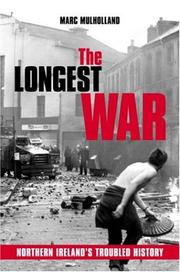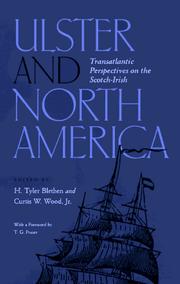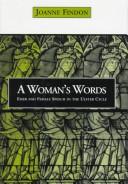| Listing 1 - 10 of 13 | << page >> |
Sort by
|
Book
ISBN: 0191636908 1283848406 9780191636905 9781283848404 9780199583119 0199583110 Year: 2013 Publisher: Oxford Oxford University Press
Abstract | Keywords | Export | Availability | Bookmark
 Loading...
Loading...Choose an application
- Reference Manager
- EndNote
- RefWorks (Direct export to RefWorks)
'Ulster Since 1600' surveys the history of the province from plantation to partition, and onwards from the formation of the Northern Ireland state to the 'Troubles' of recent decades.
Book
ISBN: 1526158922 Year: 2012 Publisher: Manchester, England : Manchester University Press,
Abstract | Keywords | Export | Availability | Bookmark
 Loading...
Loading...Choose an application
- Reference Manager
- EndNote
- RefWorks (Direct export to RefWorks)
Book
ISBN: 1283411709 9786613411709 1572338326 9781572338326 1572337540 9781572337541 9781283411707 6613411701 Year: 2012 Publisher: Knoxville University of Tennessee Press
Abstract | Keywords | Export | Availability | Bookmark
 Loading...
Loading...Choose an application
- Reference Manager
- EndNote
- RefWorks (Direct export to RefWorks)
In Ulster to America: The Scots-Irish Migration Experience, 1680-1830, editor Warren R. Hofstra has gathered contributions from pioneering scholars who are rewriting the history of the Scots-Irish. In addition to presenting fresh information based on thorough and detailed research, they offer cutting-edge interpretations that help explain the Scots-Irish experience in the United States. In place of implacable Scots-Irish individualism, the writers stress the urge to build communities among Ulster immigrants. In place of rootlessness and isolation, the authors point to the tran
Scots-Irish --- Scots --- History --- History. --- United States --- Ulster (Northern Ireland and Ireland) --- Emigration and immigration
Book
ISBN: 0813215919 Year: 2005 Publisher: Washington, D.C. : Catholic University of America Press,
Abstract | Keywords | Export | Availability | Bookmark
 Loading...
Loading...Choose an application
- Reference Manager
- EndNote
- RefWorks (Direct export to RefWorks)
Americans --- History. --- Ulster (Northern Ireland and Ireland) --- United States --- Civilization. --- Foreign public opinion, American. --- Relations

ISBN: 1280444525 0191539236 1423757378 9781423757375 9780192802927 0192802925 9781280444524 9786610444526 6610444528 9780191539237 1383002525 Year: 2002 Publisher: Oxford [England] New York Oxford University Press
Abstract | Keywords | Export | Availability | Bookmark
 Loading...
Loading...Choose an application
- Reference Manager
- EndNote
- RefWorks (Direct export to RefWorks)
The troubles in Northern Ireland have proved to be one of the most intractable conflicts in Europe since World War II. This exploration of the issues & debates about Northern Ireland sets them in the historical context of hundreds of years of conflict.
Political violence --- Ireland --- Regions & Countries - Europe --- History & Archaeology --- Violence --- Political crimes and offenses --- Terrorism --- History. --- History --- Northern Ireland --- Ulster (Northern Ireland and Ireland) --- Politics and government

ISBN: 2841331008 2821817460 2841334694 Year: 2000 Publisher: Presses universitaires de Caen
Abstract | Keywords | Export | Availability | Bookmark
 Loading...
Loading...Choose an application
- Reference Manager
- EndNote
- RefWorks (Direct export to RefWorks)
Ce livre démontre comment certaines composantes de la communauté unioniste nord-irlandaise - notamment le Parti Unioniste et l’Ordre d’Orange - ont récemment lancé une véritable campagne culturelle destinée à repenser l’image identitaire du « peuple britannique d’Ulster » et à briser le carcan des mythes fondateurs de la communauté : le siège de Londonderry et la bataille de la Boyne. Cette nouvelle image identitaire se crée à partir de plusieurs récits qui permettent à la communauté de s’imaginer sur une échelle plus vaste en repoussant ses coordonnées spatiales et chronologiques. Ces récits évoquent l’héritage millénaire des Cruthin, habitants aborigènes de l’Ulster préhistorique, l’émigration presbytérienne vers l’Amérique, ainsi que les échanges linguistiques et culturels entre le Nord de l’Irlande et l’Écosse. Cette réécriture de l’histoire identitaire débouche sur un « désenclavement » de l’espace imaginaire de la communauté unioniste ; elle ouvre la voie vers une remise en question globale des versions nationalistes de l’histoire irlandaise.
Regions & Countries - Europe --- History & Archaeology --- Ireland --- Ulster (Northern Ireland and Ireland) --- Northern Ireland --- Politics and government. --- History. --- Irlande (République) --- Londonderry --- conflit irlando-britannique --- Ordre d'Orange --- Derry --- Irlande du Nord --- langue irlandaise (gaélique) --- unionisme

ISBN: 0585178828 9780585178820 9780817308230 0817308237 0817311351 9780817311353 0817308237 Year: 1997 Publisher: Tuscaloosa, Ala. University of Alabama Press
Abstract | Keywords | Export | Availability | Bookmark
 Loading...
Loading...Choose an application
- Reference Manager
- EndNote
- RefWorks (Direct export to RefWorks)
Scots-Irish --- Americas - General --- Regions & Countries - Americas --- History & Archaeology --- Scotch Irish --- Ethnology --- History. --- History --- Ulster (Northern Ireland and Ireland) --- Cúigh Uladh (Northern Ireland and Ireland) --- Civilization. --- Emigration and immigration
Book
ISBN: 0773429557 9780773429550 9780773436497 0773436499 Year: 2010 Publisher: Lewiston, N.Y. Edwin Mellen Press
Abstract | Keywords | Export | Availability | Bookmark
 Loading...
Loading...Choose an application
- Reference Manager
- EndNote
- RefWorks (Direct export to RefWorks)
Medb of Connacht, a central female character of medieval Ireland's Ulster Cycle is read traditionally as an example of a misogynistic, patriarchal Christian campaign to suppress and silence women in early Ireland, or as symbolic of a primordial, mythic pre-Christian goddess, exempt from patriarchal censure because her behavior is ascribed to her duties as a divine sovereignty figure. In addition, this work provides the first comparative and comprehensive character analysis of the Connacht warrior queen across numerous tales in which she appears as a major player, presenting a more complete pic
Epic literature, Irish -- History and criticism. --- Tales -- Ulster (Northern Ireland and Ireland) -- History and criticism. --- Ulster cycle. --- Women and literature -- Ulster (Northern Ireland and Ireland). --- Epic literature, Irish --- Tales --- Women and literature --- Languages & Literatures --- Celtic Languages & Literatures --- Literature --- Folk tales --- Folktales --- Folk literature --- Irish epic literature --- Irish literature --- History and criticism --- Ulaid cycle --- Tochmarc Emire --- Táin bó Cúailnge --- Serglige Con Culainn --- Compert Con Culainn --- Aided Con Culainn --- Fled Bricrenn --- Fled Bricrenn ocus Loinges mac nDuíl Dermait --- Bruiden Da Choca --- Longes mac n-Uislenn --- Sgéal Chúchulainn ag Cuan Cárn
Book
ISBN: 3319593633 3319593625 Year: 2017 Publisher: Cham : Springer International Publishing : Imprint: Palgrave Macmillan,
Abstract | Keywords | Export | Availability | Bookmark
 Loading...
Loading...Choose an application
- Reference Manager
- EndNote
- RefWorks (Direct export to RefWorks)
This book examines the native Irish experience of conquest and colonisation in Ulster in the first decades of the seventeenth century. Central to this argument is that the Ulster plantation bears more comparisons to European expansion throughout the Atlantic than (as some historians have argued) the early-modern state’s consolidation of control over its peripheral territories. Farrell also demonstrates that plantation Ulster did not see any significant attempt to transform the Irish culturally or economically in these years, notwithstanding the rhetoric of a ‘civilising mission’. Challenging recent scholarship on the integrative aspects of plantation society, he argues that this emphasis obscures the antagonism which characterised relations between native and newcomer until the eve of the 1641 rising. This book is of interest not only to students of early-modern Ireland but is also a valuable contribution to the burgeoning field of Atlantic history and indeed colonial studies in general.
Ulster (Northern Ireland and Ireland) --- Colonization. --- Emigration and immigration --- History --- Cúigh Uladh (Northern Ireland and Ireland) --- Imperialism. --- Great Britain-History. --- United States-History. --- Civilization-History. --- Imperialism and Colonialism. --- History of Britain and Ireland. --- US History. --- Cultural History. --- Colonialism --- Empires --- Expansion (United States politics) --- Neocolonialism --- Political science --- Anti-imperialist movements --- Caesarism --- Chauvinism and jingoism --- Militarism --- Great Britain—History. --- United States—History. --- Civilization—History.

ISBN: 0802008658 9786612008375 1282008374 1442670541 Year: 1997 Publisher: Toronto, [Canada] ; Buffalo, [New York] ; London, [England] : University of Toronto Press,
Abstract | Keywords | Export | Availability | Bookmark
 Loading...
Loading...Choose an application
- Reference Manager
- EndNote
- RefWorks (Direct export to RefWorks)
"A Woman's Words is the first in-depth analysis of Middle Irish literature from a feminist standpoint, and the first formal critical discussion of the representation of female speech in medieval Irish literature. Joanne Findon analyses the representation of Emer, the wife of the great Irish hero Cu Chulainn, in four linked medieval Irish tales, and discusses Emer's ability to use powerful, effective words to change her fictional world and the audience's reading of that fictional world." "A Woman's Words considers Emer as a literary figure rather than a mythic archetype or a reflection of a pre-Christian Celtic goddess. Emer and the narratives she inhabits are discussed as literary constructs, and are considered within the historical and legal milieu in which these tales were told, recorded, and read."--Jacket.
Epic literature, Irish --- Women --- Tales --- Women and literature --- Folk tales --- Folktales --- Folk literature --- Literature --- Human females --- Wimmin --- Woman --- Womon --- Womyn --- Females --- Human beings --- Femininity --- History and criticism. --- History --- Ulster (Northern Ireland and Ireland) --- Languages. --- Cúigh Uladh (Northern Ireland and Ireland) --- MEDIEVAL TALES --- EPIC LITERATURE, IRISH --- WOMEN IN LITERATURE --- EMER (LEGENDARY CHARACTER) --- HISTORY AND CRITICISM
| Listing 1 - 10 of 13 | << page >> |
Sort by
|

 Search
Search Feedback
Feedback About UniCat
About UniCat  Help
Help News
News